Shade Munro & Scotland women seek elusive Six Nations win
- Published
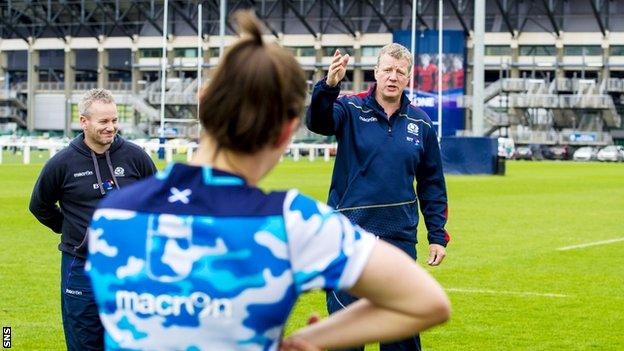
Shade Munro became Scotland women's coach last year
All the rollicking expletives and verbal manipulation of Malcolm Tucker, The Thick of It's fearsome spin doctor, could never conceal the extent of Scotland's crushing humiliation in the Women's Six Nations Championship.
The Scots have not won a game in this tournament since 2010.
They have failed to score a single point in 15 of the 25 matches played in the subsequent five championships.
Their points difference stands at 67 for - an average of 2.68 per match, less than a penalty or drop-goal - and 1,061 against.
They have breached their opponents' try-line eight times. Eight tries in 25 games.
If Scotland's men have swum against the tide in recent Six Nations, the women have been kayaking into a tsunami.
Playing catch-up against its international counterparts, Scottish Rugby channelled a portion of its £20m 2014 BT sponsorship into recruiting Sheila Begbie, successful in a similar role with the Scottish Football Association, to head up and restructure the female game.
A year later, Shade Munro, the former Scotland and Glasgow Warriors assistant coach, was appointed to marshal things on the training paddock.
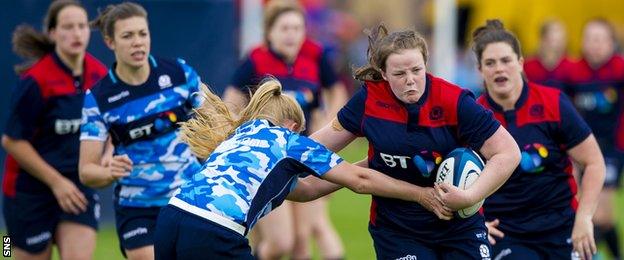
The Scotland women's team during a training camp in September
'Still very much amateur'
Munro is around seven months into his new role and paints the picture of a pitifully constrained Scotland, labouring merely to cross the start line as their rivals hare off down the track.
"Even speaking to the other [Six Nations] coaches, they're much further down the road than we are," he says.
"They're certainly better-resourced in terms of personnel, money; they have professional players.
"We're still very much amateur; still very much stuck in that amateur culture and ethos. That stems from the club game in Scotland.
"The SRU have done well introducing academies - the difference in players involved in academies and those that aren't is marked. It's just constantly banging that drum really."
Scotland women's Six Nations |
|---|
Scotland women v England women (5 February) |
Wales women v Scotland women (14 February) |
Italy women v Scotland women (28 February) |
Scotland women v France women (11 March) |
Ireland women v Scotland women (20 March) |
This will be as challenging a project as Munro will ever undertake in coaching given how far the set-up is from even the most modest of professional environs.
"When you're a professional coach you know exactly what you're doing every day, the resources are there - it's actually quite easy," he explains.
"This is a different way of coaching, which is actually a good thing.
"My perception when I came in was that the women players weren't very good, they didn't really train that hard. For the last five years, they haven't won a game in the Six Nations, so what are the reasons for that?
"I thought it must be the players themselves. That perception was totally wrong. It's not the players at all - they're hard-working, they have a real desire to succeed, they're willing to learn, they're really coachable.
"It's just not been properly resourced. There aren't that many players in Scotland, which is another reason, but partly the gap is growing because the other teams are moving on down the professional route and we aren't."
Focus on elements, not results
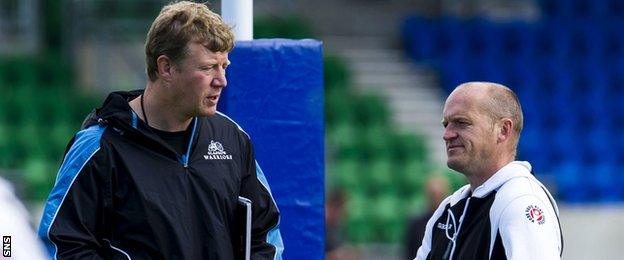
Munro worked with Gregor Townsend at Glasgow Warriors
Munro has to peel away all the intricacies of coaching elite teams, immerse himself in the realities of his new surroundings.
The old Warriors playbook has been slid back on to its shelf for now and the process of gradually bettering his players, step by punishing step, is underway.
"I started by looking at last year's Six Nations and it's pretty obvious what needs to be worked on," he says.
"Upskilling the players, getting them fitter, improving their all-round skills, getting them to enjoy playing again.
"I'm not saying they didn't enjoy playing last year, but you imagine losing every game, every time you put a Scotland jersey on, it's very tough.
"It's building their confidence back up, allowing them to try things rather than them being scared to do so, pointing out things they're good at."
The towering ex-lock, with seven Scotland caps to his name, will not burden his players with undue emphasis on results in this year's tournament.
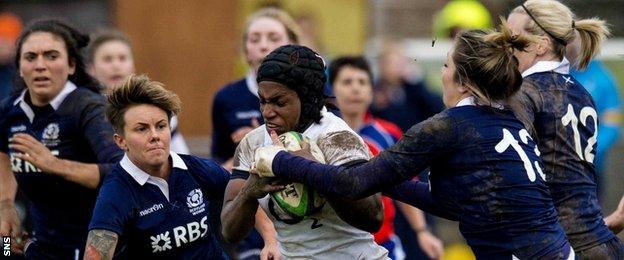
Scotland last hosted England in 2014
Their campaign begins with a Calcutta Cup duel on Friday evening against a visiting England team that has dipped since lifting the 2014 World Cup, but still stuck eight tries past the Scots a year ago.
"That's not the way to coach them at the moment," he says. "What I'm trying to do is break the game down into compartments - defence, set piece, attack, contact - and refer back to that.
"If you succeed in all those areas, you'll win games. So when you don't win games, one, maybe two of those areas you haven't achieved - that's what you then focus on.
"If I can improve them, which I have no doubt I will, and if they can get a win, then fantastic," he adds.
"That may be a time coming, but you never know."
- Published3 February 2016

- Published3 February 2016

- Published3 February 2016
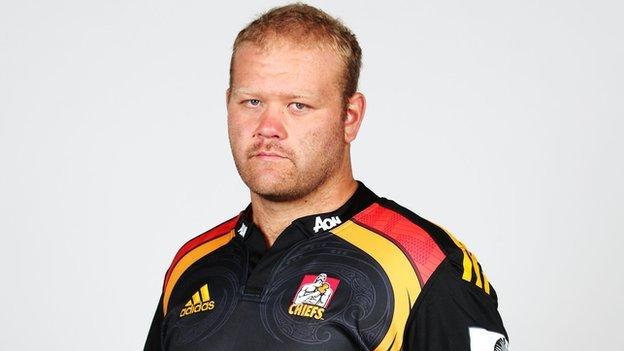
- Published14 September 2016
